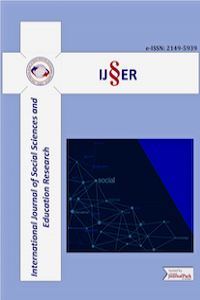‘Study drawing’ in architecture graphic presentation style jomathir-hybrid ‘a+architecture’ drawing manually: Phenomenon three dimensional
Three dimensional illustration line drawing objects manually (3DiLDom), Architectural Graphics Presentation Drawing (AGPD), Line Visual Art (LVA),
___
- Alberto, J., Gonçalves, P., & Italiana, S. (2017). Using Group Drawings Activities to Facilitate the Understanding of the Systemic Aspects of Projects. International Journal of Instruction, 10(Drawings Activities), 3–22. Brooks, M. (2003). Drawing to Learn. Beyond The Journal, (September), 1–6. Distia Apriyandini. (2016). An Analysis of English Teaching Strategies at Vacational Hight School of Art. Sebelas Maret University. Elun Loros. (2006). Pendekatan Medium Hibrid Dalam Karya. Universiti Malaysia Sarawak. Jomathir, J. (2002). Water Colour Techniques. (Jomathir, Ed.) (First Edit). Johor Bahru,Johor. Jomathir, J. (2009). Tips dan Teknik Lakaran. (Jomathir.Johari, Ed.) (First Edit). Johor Bahru,Johor: Intisar Publisher. Jomathir, J. (2014). Koleksi Langkah Demi Langkah Ilustrasi Kenderaan. (Nor Azman Hj.Markaban, Ed.) (Cetakan Pe). Johor Bahru,Johor: Intisar Publisher. Jomathir, J. (2016). Black and White Architectural Illustration. (N. A. Markaban, Ed.) (Third edit). Johor Bahru,Johor: Intisar Publisher. Keane, W. (2010). “ Introduction : Material Affinities .” WRECK:Volume 3, Number 1(2010), 3(1), 1–4. Lyon, P. (2015). Manual Drawing in Clinical Communication:Understanding The Role of Clinical Mark-Making. 4th International Visual Methods Conference, 5(1). Madar, A. R., & Hashim, M. N. (2011). Effectiveness of Using Graphic Animation Courseware for Students with Different Cognitive Styles and Spacial Visual Abilities. Journal of Technical Education and Training, 3(1), 47–58. Mohammad, M., Ibrahim, N., Rusdi, M., Nasir, M., Mat, K., & Faisal, M. (2015). Art via Architecture ’ Lukisan Kajian ’ Style in Hybrid Model ’ A + AGPD ’: Observation ̵ ’Garisan Stroke Line (gSLine). Procedia - Social and Behavioral Sciences, 195, 473–479. http://doi.org/10.1016/j.sbspro.2015.06.490 Mohd Tafizam Mohd Taib, R. M. (2017). Sains Humanika Kemudahan Prasarana Dalam Pelaksanaan Mata Pelajaran Teknologi. SainsHumanika, 5(Kemudahan Prasarana), 11–17. Mohsenian, S. M. (2016). A New Approach to the Role and Effects of Modern Art on Graphics. International Journal of Scientific & Research, 7(1), 262–266. Neto, A. T. (2014). The Architecture of Virtual Learning Environments under the Conceptions of Bakhtinian Studies / Arquitetura de Ambientes Virtuais de Aprendizagem Sob a ótica Dos Estudos Bakhtinianos. Bakhtiniana,Sao Paulo, 9 (2): 171-190, July/Dec.2014, 9(2), 171–190. Ocvirk et al. (2013). Art Fundamentals Theory And Practice (Twelfth Ed). Mc Grow- Hill Companies,Inc.,1221 Avenue of The americas,New York,NY 10020. Olotuah, A. O., Taiwo, A. A., & Ijatuyi, O. O. (2016). Pedagogy in Architectural Design Studio and Sustainable Architecture in Nigeria. Journal of Educational and Social Research, 6(2), 157–164. http://doi.org/10.5901/jesr.2016.v6n2p157 Simon T Ghanat, K. B. (2017). Pedagogical Techniques Employed in an Engineering Drawing Course. 2017 ASEE Zone II Conference, (Drawing Course), 1–6. Szubielska, M., Niestorowicz, E. W. A., & Introduction, T. (2016). Drawing Without Eyesight.Evidence From Congenitally Blind Learners. Roczniki Psychologiczne Annls of Psychology, (Drawing), 681–700. http://doi.org/DOI: http://dx.doi.org/10.18290/rpsych.2016.19.4-2en MAGDALENA Xu, B., Zhong, & Y., & Zhong, Y. (2012). Three-Dimensional Technology for Apparel Mass Customization: Part III: Visualization of Three- dimensional Garments Three-dimensional Technology for Apparel Mass Customization Part III: Visualization of Three-dimensional Garments. Journal of The Textile Institute, 94(May 2012), 1–2. http://doi.org/10.1080/00405000308630597
- Yayın Aralığı: Yılda 4 Sayı
- Başlangıç: 2015
- Yayıncı: Mahmut DEMİR
Ulus inşa sürecinde kullanılan iletişim stratejileri
Vasileios ZAGKOTAS, İoannis FYKARİS
Medya okuryazarlığı dersi ve öğretmenlerin derse yaklaşımları üzerine bir değerlendirme
Albert Camus’un saçma kavramı bağlamında Belleğin Kış Uykusu romanı
